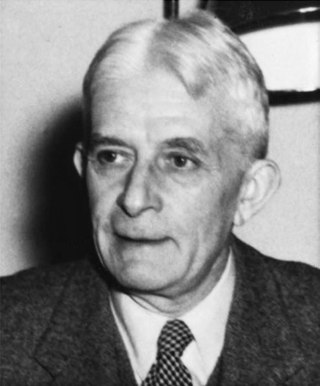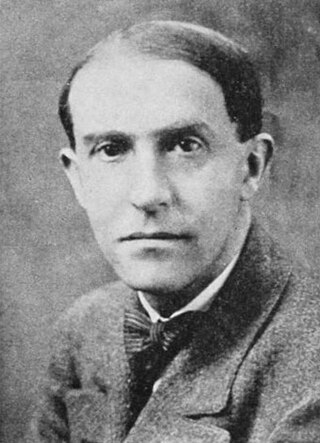Gestalt psychology, gestaltism, or configurationism is a school of psychology and a theory of perception that emphasises the processing of entire patterns and configurations, and not merely individual components. It emerged in the early twentieth century in Austria and Germany as a rejection of basic principles of Wilhelm Wundt's and Edward Titchener's elementalist and structuralist psychology.

Max Wertheimer was a psychologist who was one of the three founders of Gestalt psychology, along with Kurt Koffka and Wolfgang Köhler. He is known for his book, Productive Thinking, and for conceiving the phi phenomenon as part of his work in Gestalt psychology.

Wolfgang Köhler was a German psychologist and phenomenologist who, like Max Wertheimer and Kurt Koffka, contributed to the creation of Gestalt psychology.
Gestalt Theoretical Psychotherapy(GTP) is a method of psychotherapy based strictly on Gestalt psychology. Its origins go back to the 1920s when Gestalt psychology founder Max Wertheimer, Kurt Lewin and their colleagues and students started to apply the holistic and systems theoretical Gestalt psychology concepts in the field of psychopathology and clinical psychology. Through holism, "a person's thinking, feeling, actions, perceptions, attitudes and logical operations" are seen as one unity. Many developments in psychotherapy in the following decades drew from these early beginnings, like e.g. group psychoanalysis (S. Foulkes), Gestalt therapy (Laura Perls, Fritz Perls, Goodman, and others), or Katathym-imaginative Psychotherapy (Hanscarl Leuner).
The Berlin School of Experimental Psychology was founded by Carl Stumpf, a pupil of Franz Brentano and Hermann Lotze and a professor at the University of Berlin, in 1893. It adhered to the method of experimental phenomenology, which understood it as the science of phenomena. It is also noted as the originator of Gestalt psychology. Noted members include Max Wertheimer, Kurt Koffka, and Wolfgang Köhler.
James Jerome Gibson was an American psychologist and is considered to be one of the most important contributors to the field of visual perception. Gibson challenged the idea that the nervous system actively constructs conscious visual perception, and instead promoted ecological psychology, in which the mind directly perceives environmental stimuli without additional cognitive construction or processing. A Review of General Psychology survey, published in 2002, ranked him as the 88th most cited psychologist of the 20th century, tied with John Garcia, David Rumelhart, Louis Leon Thurstone, Margaret Floy Washburn, and Robert S. Woodworth.
Fritz Heider was an Austrian psychologist whose work was related to the Gestalt school. In 1958 he published The Psychology of Interpersonal Relations, which expanded upon his creations of balance theory and attribution theory. This book presents a wide-range analysis of the conceptual framework and the psychological processes that influence human social perception. It had taken 15 years to complete; before it was completed it had already circulated through a small group of social psychologists.

Edgar John Rubin was a Danish psychologist/phenomenologist, remembered for his work on figure-ground perception as seen in such optical illusions like the Rubin vase.
Concentrative movement therapy (CMT) is a psychotherapeutic method for group and individual therapy which is based on thought models stemming from psychodynamic psychotherapy and depth psychology. Taking as its point of departure the theory that perception is composed of sensation and experience, CMT is interested in the conscious perception of the body in the "here and now" against the background of the individual life and learning story.
Andrew N. Meltzoff is an American psychologist and an internationally recognized expert on infant and child development. His discoveries about infant imitation greatly advanced the scientific understanding of early cognition, personality and brain development.
Roberta "Bobby Lou" Klatzky is a Professor of Psychology at Carnegie Mellon University (CMU). She specializes in human perception and cognition, particularly relating to visual and non-visual perception and representation of space and geometric shapes. Klatzky received a B.A. in mathematics from the University of Michigan in 1968 and a Ph.D. in psychology from Stanford University in 1972. She has done extensive research on human haptic and visual object recognition, navigation under visual and nonvisual guidance, and perceptually guided action.
Richard N. Aslin is an American psychologist. He is currently a senior scientist at Haskins Laboratories and professor at Yale University. Until December, 2016, Dr. Aslin was William R. Kenan Professor of Brain & Cognitive Sciences and Center for Visual Sciences at the University of Rochester. During his time in Rochester, he was also director of the Rochester Center for Brain Imaging and the Rochester Baby Lab. He had worked at the university for over thirty years, until he resigned in protest of the university's handling of a sexual harassment complaint about a junior member of his department.
Jan Johan Koenderink is a Dutch physicist and psychologist known for his researches on visual perception, computer vision, and geometry.

Mary Henle was an American psychologist who's known most notably for her contributions to Gestalt Psychology and for her involvement in the American Psychological Association. Henle also taught at the New School of Social Research in New York; she was involved in the writing of eight book publications and also helped develop the first psychology laboratory manual in 1948 based on the famous works of Kurt Lewin.

Karen E. Adolph is a psychologist and professor known for her research in the field of infant motor development. She is the 2017 recipient of the Kurt-Koffka medal from the University of Giessen. Previous honors include the 1999 APA Boyd McCandless Award and 2002 American Psychological Foundation Robert L. Fantz Memorial Award. She has served as the President of the International Congress on Infant Studies. Adolph and her colleagues developed computerized video coding software, called Datavyu, and state-of-the-art recording technology to observe and code behavior. A related project, Databrary, provides a repository for video recordings of behavior and encourages open data sharing across research labs. Adolph is a recipient of a MERIT Award from the National Institutes of Child Health and Human Development in support of her innovative research.
Edward Howard Adelson is an American neuroscientist who is currently the John and Dorothy Wilson Professor of Vision Science at Massachusetts Institute of Technology and an Elected Fellow of the National Academy of Sciences and American Academy of Arts and Sciences.

Kurt Koffka was a German psychologist and professor. He was born and educated in Berlin, Germany; he died in Northampton, Massachusetts, from coronary thrombosis. He was influenced by his maternal uncle, a biologist, to pursue science. He had many interests including visual perception, brain damage, sound localization, developmental psychology, and experimental psychology. He worked alongside Max Wertheimer and Wolfgang Köhler to develop Gestalt psychology. Koffka had several publications including "The Growth of the Mind: An Introduction to Child Psychology" (1924) and "The Principles of Gestalt Psychology" (1935) which elaborated on his research.
Mary Myleen Hayhoe is an Australian American psychologist who researches vision. She has developed virtual environments for the investigation of visually guided behaviour. In 2017, Hayhoe was awarded the Vision Sciences Society's Davida Teller Award. In 2002, she was awarded the Optica's Edgar D. Tillyer Award for her contributions to visual perception and cognition. In 2024, Hayhoe was awarded the Kurt Koffka Medal for "advancing the fields of perception or developmental psychology to an extraordinary extent".






